One thing is for sure, the proposed Sugar Sweetened Beverage Tax is a job creator. The beverage industry will spend an estimated $1 million in Richmond trying to defeat it. There will be lots of money for printers, community organizers, news media (ads) and paid precinct walkers. Don’t forget free barbecue.
Instead of sticking to objective arguments, opponents are playing the race card, characterizing the tax as an elitist plot against poor African Americans and Latinos. High profile, elected African Americans like Corky Booze and Nat Bates oppose the measure, while others like Jovanka Beckles and Whitney Dotson support it. BAPAC opposes it while Blacks, Mobilizing, Organizing and Educating Richmond support it.
Based on the leadership, advocates for and against the tax in the African American community are typically divided between those who routinely support big business and the establishment (Booze, Bates and BAPAC) while opposing the tax and more populist politicians like Beckles and Dotson who support the tax. Ironically, those who characterize the soda tax as elitist are those who routinely support the elite.
Meanwhile, a formal complaint has been filed against the Community Coalition Against Beverage Taxes for violating the Richmond Municipal Code fair Elections Ordinance. See below:
As a resident of Richmond, I am writing to request you to take prompt action in response to the Community Coalition Against Beverage Taxes recent mailer entitles “Why is Richmond Coming Together to Fight Beverage Tax,” opposing the Soda Tax which blatantly ignored Richmond's Ordinance 2.42.075 which requires that out of city special interests clearly identify themselves on mass mailings.
The violations of the RMC are as follows:
- 2.42.075 Section (a) (2) requires that "if the committee has received at least one-third of its total contributions...from large out of city contributors... the whole top third of the disclosure shall consist solely of the statement "Major funding from large out of city contributors". As the "American Beverage Association" is a large out of city contributor, and as it gave at least one third of the committee's contributions, this disclosure is required. But instead of making this legally required disclosure, the mailer referred to "thousands of Richmond residents, labor and businesses".
- Instead of following Section 2.42.075's requirement that the major funder American Beverage Association be listed by itself, the mailer buried that disclosure with other sugar coating ("thousands of Richmond residents, labor and businesses"), which serve to bury the disclosure in the fine print. Although the BS (Big Soda) campaign is free to use the rest of the mailer to imply that this was paid for by local interests, it is not free to do that in the part of the mailer where the disclosure is required.
- In order to promote meaningful disclosure and prevent information from being buried in the fine print the law requires that the bottom 25% of the one of the mailer be solely devoted to the required disclosures. This was not done. It was less than 25% measured from top to bottom, and there was a graphic to the right. Further, part of the space at the bottom was used to attempt to document the lie that Finance Director James Goins testified that the Soda Tax would raise "8 MILLION PER YEAR". The BS (Big Soda) Campaign is legally free to lie about Mr. Goins' estimates (he actually estimated $2-8 million, not $8 million), but they cannot tell that lie in this particular part of the mailer. Likewise the BS Campaign is legally free to lie about the very nature of the tax (they say "Beverage Tax" not "Soda Tax", or "Sugar Sweetened Beverage Tax"), but they are not legally free to tell this lie in the bottom 25% of the front page of their mailer.
We all understand that well-meaning inexperienced lay persons sending out mailers can run afoul of disclosure laws. But that is not the case here. The BS Campaign's political consultant (Whitehurst and Mosher) recently did the casino ballot measure campaign, and they have the best attorneys money can buy. Any claims that they were ignorant of the Richmond disclosure law should be taken with a grain of sugar. The BS campaign has clearly made a tactical decision that they are willing to tell any lie, and violate any law because they can use their enormous wealth to overwhelm and drown out any complaints. Please prove them wrong and take appropriate action pursuant to the RMC.
Following is a digest of recent media coverage.
Groups take sides in Richmond soda tax debate
By Robert Rogers
Contra Costa Times
Posted: 07/30/2012 01:31:01 PM PDT
Updated: 07/30/2012 05:18:48 PM PDT
RICHMOND -- The debate over whether to impose steep taxes on sugary drink sales in the city has bubbled over with rising intensity in recent days as community leaders and influential organizations take sides on the divisive issue.
The Black Women Organized for Political Action on July 25 ended weeks of speculation by coming out against the tax, which would levy a 1-cent-per-ounce tax on sales of all beverages containing added sugar.
There is a nonbinding companion measure advising the city to use proceeds from the tax, estimated at $2 million to $8 million annually, for education and recreational programs aimed at reducing obesity among local kids. Both will appear on the Nov. 6 ballot.
"We don't believe a regressive tax to the poorest residents of Richmond is the right approach," said Kathleen Sullivan, president of BWOPA's Richmond chapter.
Two days later, Blacks, Mobilizing, Organizing and Educating Richmond came out in favor of the tax, called the Fit for Life campaign by supporters.
"These ballot measures are part of the community's response to the serious health challenges facing our youth," said B-MOER spokeswoman Nicole Valentino.
Then on Saturday, the Community Coalition Against Beverage Taxes, a group funded by the powerful American Beverage Association, held a townhall-style meeting in a city recreation hall.
More than 80 people turned out and were served free barbecue from local favorite C.J.'s Barbecue & Fish, many washing down the sweet ribs and chicken with an array of popular sodas that chilled in colorful drums of ice.
Several staff members were on hand from the San Francisco-based consulting firm hired by the ABA to organize against the tax in Richmond.
Panelists at the meeting, including black Councilmen Corky Booze and Nat Bates, hit repeatedly on what they regard as the racial dynamic of the tax. Opponents of the measure portray the tax as an overreach by mostly white progressives in the city and say it will bleed money from the poorest communities and small businesses while doing little to curb consumption.
"The sponsors of this tax are dividing our city; this is division upon our people," said Joe Fisher, treasurer of the Black American Political Action Committee, an opponent to the tax since it was first proposed by Councilman Jeff Ritterman, a former cardiologist who is white.
"This has become a national issue, and we must unify against this tax," Fisher said.
The meeting offered a stark contrast to gatherings and outreaches by tax proponents, led by the Richmond Progressive Alliance, a volunteer political coalition that has tilted the power balance in Richmond away from Chevron Corp., the Chamber of Commerce and other commercial interests.
Although RPA leaders and subgroups -- B-MOER was founded by Councilwoman Jovanka Beckles, an RPA member -- stress Richmond's 52 percent childhood obesity rate and university studies backing their approach, opponents bristle that the tax is regressive and paternalistic in its focus on the city's large black and Latino populations.
"It's almost insulting," Sullivan said at Saturday's meeting, "as though we need to be taxed because we have no self-control."
Valentino, who works in Mayor Gayle McLaughlin's office, said the situation demands to be addressed in part through public policy.
"Diabetes, cardiovascular disease and asthma are rampant diseases in our community, and we must do something to start saving the children now," Valentino said.
The battle for votes in Richmond is intensifying as the debate over sugary drinks and public health has gone national. New York Mayor Michael Bloomberg is pushing for a ban on sales of sodas larger than 16 ounces. In El Monte, a Los Angeles area suburb, the City Council last week became the second in the state to approve a November ballot measure proposing a 1-cent-per-ounce tax, modeled after Richmond's.
Richmond tax proponents insist that proceeds will be used solely for health and anti-obesity programs. But El Monte leaders tout their tax as a chance to curb soda consumption and help close a budget deficit. Contact Robert Rogers at 510-262-2726. Follow him at Twitter.com/roberthrogers
Richmond Journal
Plan to Tax Soda Gets a Mixed Reception
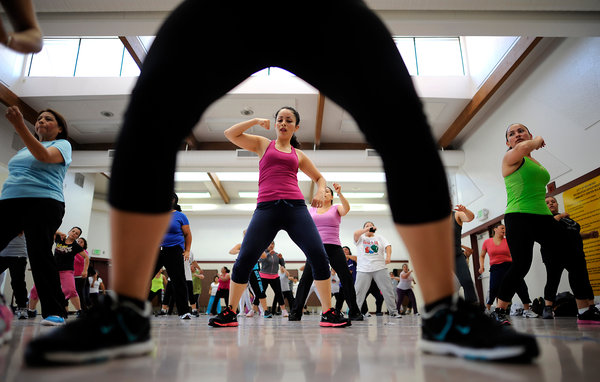
Michael Short for The New York Times
Fitness class at a community center in Richmond, Calif., a city with high rates of poverty and obesity.
By PATRICIA LEIGH BROWN
Published: June 2, 2012
RICHMOND, Calif. — The California good life — the one of endless varieties of lettuce and tasting rooms nestled in vineyards — does not extend to Richmond’s Iron Triangle, a neighborhood named for the railroad tracks that delineate its borders and historically one of the neediest communities in the Bay Area.

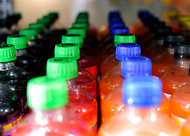
Michael Short for The New York Times
A local effort in Richmond, Calif., to tax sweetened beverages has met resistance.
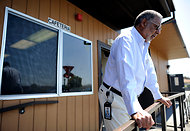
Michael Short for The New York Times
One vocal opponent of the tax is Courtland Boozé, a City Council member who calls it a hardship on poor people.
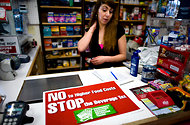
Michael Short for The New York Times
Norma Vazquez, a cashier, worries about her son, who is 10 years old and 135 pounds.
Even here at a sweaty Zumba class sponsored by a nonprofit group called Weigh of Life, the city’s proposal for a one-cent-per-ounce tax on sugar-sweetened beverages, which is to appear on the November ballot, meets up against the hard realities of residents’ lives.
“What don’t I have?” asked Rita Cerda, a longtime soda devotee, ticking off her ailments, including diabetes, high blood pressure and asthma. She is also overweight.
“I have problems drinking water,” she said. “I don’t like water.”
The proposed tax, a license fee on businesses selling sweetened drinks, would require owners of bodegas, theaters, convenience stores and other outlets to tally ounces sold and, presumably, pass the cost on to customers. It is the most visible West Coast municipal challenge yet to Big Soda, as advocates are fond of calling it.
Pending voter approval, money from the tax, which has been championed by Dr. Jeff Ritterman, a cardiologist turned City Council member, would go toward fighting childhood obesity through more bike lanes, nutritional education and after-school sports programs. Already a contentious issue locally, the potential tax is also being viewed as a beachhead by a coalition of beverage manufacturers, merchant groups and labor unions who are organizing to defeat it.
In Richmond, which has a substantial African-American and Latino population and where poverty rates are double the national average, an estimated 52 percent of elementary school students are overweight or obese, said Dr. Wendel Brunner, the director of public health for Contra Costa County, which includes Richmond.
As in other places, soda consumption is highest among teenagers, with more than two-thirds downing 1.8 sugar-sweetened beverages a day. Based on 242 calories a serving for a 20-ounce bottle of Coke, that equals roughly 150,000 extra calories and can lead to more than 20 pounds of weight gain a year, Dr. Brunner said. A recent study found an average of five retail food outlets within a quarter mile of every Richmond school.
Alongside the announcement last week by Mayor Michael R. Bloomberg of New York supporting an outright ban on the sale of sweetened drinks larger than 16 ounces, the coming vote in Richmond may be a sign that soda and similar beverages are becoming the new tobacco in terms of public perception of health risks.
“Both are pretty bold moves that wouldn’t have been imaginable even five years ago,” said Kelly M. Brownell, the director of the Rudd Center for Food Policy and Obesity at Yale University, which conducted much of the research supporting the efficacy of a one-cent beverage tax. “It shows that government is beginning to stand up to the food industry and there is more public support for doing so.”
If the Richmond ordinance passes, it will be the first of its kind in the country intended specifically to combat obesity. But soda taxes have failed elsewhere — most notably in Philadelphia, where Mayor Michael A. Nutter’s attempts to impose a 2-cents-per-ounce charge on sugary drinks have sputtered twice. Nevertheless, Mr. Nutter is scheduled to be the keynote speaker this week at the nation’s first Sugary Drinks Summit in Washington, sponsored by the Center for Science in the Public Interest.
In April, a Field Poll commissioned by a private statewide health foundation found that 62 percent of California voters surveyed said they supported imposing a special fee on sodas and soft drinks if money was used to fight obesity.
In Marin County, just across the bridge from Richmond but far more affluent, the county’s third “Soda-Free Summer,” largely a cheerleading effort for more healthy choices, has just begun. Marin’s obesity rates are among the lowest in the state, reflecting both its wealth and the profusion of parks and open spaces, where families may be spotted on weekends pushing all-terrain strollers up hiking trails with majestic ocean views.
In Richmond, many poor neighborhoods lack backyards and safe streets. The city’s socioeconomic woes date to World War II, when more than 60,000 people arrived to work in the Kaiser Shipyards, quadrupling the city’s population in two years. After the wartime boom, much of the worker housing and industrial areas eventually gave way to urban blight. Today, Richmond has the Bay Area’s highest youth mortality rate.
Courtland Boozé is a City Council member and a vocal opponent of the soda tax. “We are primarily an economically suppressed community,” he said. “It will be a huge hardship.
“I eat sweet potato pie and candied yams,” continued Mr. Boozé, who is from Louisiana. “And what about cupcakes? Are they going to tax those?”
The city’s Chamber of Commerce is also opposed to the tax. A group fighting the tax that includes the beverage industry has begun dropping off “Community Coalition Against Beverage Taxes” placards at La Flore de Jalisco Market, a small, cheerful grocery store where soda bottles in dozens of hues match the colorful piñatas hanging from the ceiling.
Norma Vazquez, a cashier, worries about her son, Eric, who is 10 years old and weighs 135 pounds. “My husband buys soda, but the doctor says no soda, just water,” she said.
Charles Finnie, known as Chuck, a vice president of BMWL, a San Francisco lobbying firm, called the tax “an administrative nightmare for local businesses” that would also put them at a competitive disadvantage, with customers opting for cheaper soda in nearby cities.
But Dr. Ritterman, the cardiologist and council member, argues that obesity-related diseases “particularly fall on our black, brown and poor communities” and that the tax would send a strong message.
Dr. Robert H. Lustig, a professor of pediatrics in the endocrinology division at the University of California, San Francisco, says that the disproportionate rates of obesity in places like Richmond lead to more Type 2 diabetes, high blood pressure, lipid problems, strokes and, it appears likely, cancer and dementia.
“It’s already a tax on poor people,” Dr. Lustig said, referring to the lack of access to health insurance.
At the RYSE Youth Center, founded 12 years ago after the killing of four high school students, the soda issue seemed both close to the heart and far away.
Kayla Miller, an 18-year-old college freshman, said that if complexion problems from too much sugar would not deter her friends from drinking sodas, neither would a tax.
Shivneel Sen, 14, does not favor the tax but knows how the money should be spent if it passes.
“The police came heck of late,” he said, recalling the recent death of a best friend. “We need more of them.”
Kimberly Aceves, the center’s executive director, says that too often, the burden for making healthy choices falls unfairly on young people. Society may say “go exercise,” she said, “but if the community isn’t safe, how many kids are going to go out running?”
“Soda is bad for you,” Ms. Aceves said. “So is violence.”
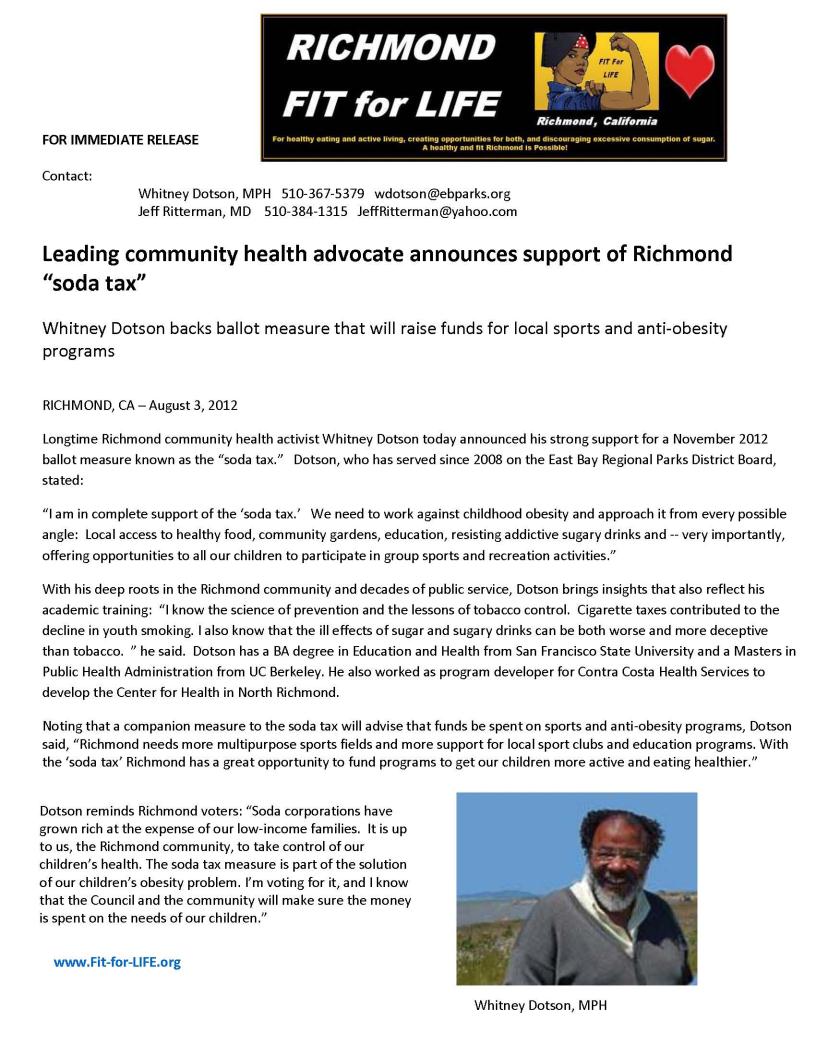

Richmond a City Divided

By Who? And Why?
 
Photos by Joe Fisher, BAPAC
By there own admission supporters of the tax believes that what they do is more important than what they say and we agree. They say One Richmond. They also say that A Better Richmond is possible only when all work together to unify the different populations that make up our diverse city. The Richmond Beverage Tax will have little impact on obesity and diabetes. What it will do is put a financial burden on low and middle income households. It will affect the economy of Richmond at a time when the unemployment rate for the nation is 8.2% and 14.2 % in Richmond and much higher for African Americans. Tax revenue collected will go into the city's general fund which means that this group can use funds as they see fit.
- We could have worked together on how to create jobs in our city but they have decided to tax their citizens in the name of LOVE. In other words you don't have the discipline to make the right decisions so we are going to make them for you in the form of a punishment tax.
- We could have worked on healthcare options, we don't have a health clinic in Richmond and this group chose to divide our city by a proposing a misguided tax.
- We could have worked together on public safety initiatives- Richmond ranks 9th as the most dangerous city in the U.S., with black on black crime running rampant for years. But this group chose to divide our city by proposing an unfair and misleading tax.
- We could have worked together on education improving exit exam results, school attendance and dropout rates; instead this group is proposing an unfair tax on Richmond residents and businesses that can least afford it.
Our leaders are all very bright, intelligent and crafty
      
L-R: McLaughlin, Ritterman, Beckles, Butt, Langlois, Rogers, and Martinez
Now We Have the Who What About the Why?
- Why would these upstanding bright leaders take a position that would divide our City?
- Why is it that the community that is most affected by this division is the African American community?
- Whyis it that this group has not received an endorsement of this unfair and misleading tax from:
- Black Men and Women (BMW)
- National Association for the Advancement of Colored People (NAACP)
- Black Women Organized For Political Action (BWOPA)
- National Brotherhood Alliance (NBA)
- Black American Political Action Committee of Contra Costa County (BAPAC)
- Black Churches
- Black Doctors or Black Medical Professionals
Why is it that Jovanka Beckles who has been a member of BWOPA for many years, after a majority vote of BWOPA members to oppose the tax, immediately created a new black group to recruit young minorities to circulate information in the community to support this unfair tax?
Why is it that this group made up of green party, tea party and some democrats say that in all their activities and campaigns that they refuse to accept contributions from large corporations, but in the 2008 election campaign they received large contributions from the California Grand Casino, Napa Valley Casino, and the Oaks Card Club located in the City of Emeryville. By their own admission what they do is more important than what they say.
The Black American Political Action Committee believes that this division in our city is no accident. The division was created to do exactly what it is doing; pitting black against black, white against blacks and the question is why? The answer is because it has worked in the past, especially close to the election season.
Let's prove them wrong by working together as a community. We cannot allow them to punish us with this tax in November. We need your help. We need you to stand with us to defeat this unfair tax. Please complete the attached form to show your opposition to the soda tax. Click Here - Soda Tax Opposition Form |
Drink lobby gears up to fight soda tax plan in California city
Tim Reid Reuters
7:40 p.m. CDT, July 27, 2012
(Reuters) - Beverage industry groups are planning ways to oppose a proposed soda tax in the California city of El Monte because of fears other U.S. cities across America might adopt similar taxes on sugary drinks.
The El Monte city council on Tuesday approved a measure that would add a 1 cent tax for every ounce of "sugar sweetened" drinks. The proposal is scheduled to be voted on by city residents in November's election.
El Monte's mayor said the tax would provide badly needed revenue for a city that has been forced to slash its workforce to save money, and would help fight obesity in a city where half the children have weight problems.
Industry groups quickly said they will marshal forces to kill off the measure. They already are fighting a similar tax proposed two months ago by the city of Richmond, California.
"Even if those don't pass in November, there could certainly be the potential of future tax threats in other cities," Karen Hanretty, vice-president of public affairs for the American Beverage Association, said.
"We will support any 'no' campaign," Hanretty said.
Rising deficits have forced three California cities to file or plan bankruptcy petitions since June. The city council of San Bernardino voted on July 19 to seek Chapter 9 protection.
"This tax is a sign of the times," said Bob Achermann, executive director of the California/Nevada Soft Drink Association, said. "City governments are looking for revenue. We think this is a misguided approach."
El Monte's mayor, Andre Quintero, said his city is not facing bankruptcy and had managed to balance its budget for fiscal year 2013.
But in a city with 13.7 per cent unemployment, far exceeding the national average of 8.1 per cent, El Monte cut its workforce from 420 employees to 290 in the past four years.
"We have long-term challenges," Quintero said. "We need the revenue."
With more Americans concerned about obesity, especially in children, the campaign against soft-drinks is gaining momentum from coast to coast.
In New York City, Mayor Michael Bloomberg has proposed a ban on large sodas, the first of its kind in the nation, which New York's Board of Health is expected to pass in September.
Bloomberg's proposal would limit servings of sugary drinks to 16 ounces (473 ml) at most restaurants, theaters, delis, vending carts and stadium concessions.
A state-wide soda tax proposal last year by Democratic Californian assemblyman Bill Monning failed after vigorous opposition from a broad coalition including the California Chamber of Commerce and the California Restaurant Association.
(Reporting By Tim Reid; Edited by Ronald Grover and David Gregorio)
(This story was corrected to recast the lead to correct reference to scope of anti-tax campaign)
Copyright © 2012, Reuters
San Mateo County sipping on the thought of a soda tax
By Bonnie Eslinger
Daily News Staff Writer
Posted: 08/03/2012 05:59:47 AM PDT
Updated: 08/03/2012 05:59:54 AM PDT
Click photo to enlarge
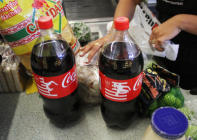
A cashier bags soda at Chavez Supermarket in North Fair Oaks on... ( Kirstina Sangsahachart )
With reduction of sugary beverages as the goal, San Mateo County officials are floating the idea of pushing for a "soda tax" in unincorporated areas similar to one voters in Richmond are being asked to approve this November.
In May, the county's health department posted a poll on its website asking "Do you think a tax on soda would help reduce obesity?" It was linked to a 1,138-word explanation under the title, "A soda tax could help stop us from pouring on the pounds."
And in October, Supervisor Rose Jacobs Gibson is scheduled to host city and community leaders for a discussion about ways to encourage residents to consider the bad health effects of sugar-laced drinks. Richmond city leaders have been invited to the event and their soda tax is expected to be part of the discussion, said Charisse Lebron-Cannon, Jacobs Gibson's chief legislative aide.
She underscored that a soda tax was an idea, not a proposal.
"There hasn't even been extensive dialogue on it, that was just one of the ideas that's come up," Lebron-Cannon said. "At no point has the supervisor said, 'This is something I want to put the county's resources toward.' " Jacobs Gibson was unavailable for comment Thursday.
According to the information posted on the health department's website, more than half a million dollars is spent in the county each year on obesity-related medical costs.
"The money generated by a soda tax could help fund health care initiatives, such as childhood nutrition and obesity prevention programs," according to the website post. "This would help keep people from getting sick in the first place."
San Mateo County went public with its interest in a possible soda tax about the same time the Richmond City Council voted to put a one-cent-per-ounce surcharge on soda and other sugary drinks on the Nov. 6 ballot. The May 15 vote thrust the city into a national debate on what role government should play, if any, in preventing the public from making unhealthy decisions.
Meanwhile, New York City Mayor Michael Bloomberg has proposed banning restaurants and other food establishments from selling sugary drinks in containers larger than 16 ounces.
Results from San Mateo County's informal online poll suggest that a soda tax could be a tough sell. Of 403 respondents, 51 percent said a soda tax "would not help" reduce obesity, 42 percent said it "would help make a difference" and 7 percent were uncertain.
ST Mayer, the county's director of health policy and planning, said the evidence is clear that sugar-sweetened beverages -- including sodas, some sports drinks and iced teas -- contribute to obesity.
"Certainly from a public health perspective we're supportive of a tax; we know this could make a difference in the health of our residents," Mayer said.
Mayer said the idea comes on the heels of other efforts, including a ban adopted at the end of last year on sugar-sweetened drinks in county vending machines, cafeterias and meetings.
"We know choices are limited by the choices people have in the environment around them," Mayer said. "If we make them (sugar-sweetened beverages) more expensive, less marketed and less available, we know people will make healthier choices."
In June, the American Medical Association endorsed soda taxes as one way to pay for anti-obesity programs.
The American Beverage Association responded with a statement that said that such taxes are "discriminatory" and "misguided" and would not "have a meaningful impact on obesity."
The idea of a soda tax has not come before the Board of Supervisors, said county spokesman Marshall Wilson.
Olivey Rumbo, a manager at the Chavez Supermarket on Middlefield Road in North Fair Oaks, said whatever the purpose, she's sure customers wouldn't be happy about paying extra for sodas, since they already grouse about the California Refund Value -- the added five- to 10-cent fee for recycling cans and bottles.
Email Bonnie Eslinger at beslinger@dailynewsgroup.com; follow her at twitter.com/bonnieeslinger.
El Monte joins Richmond, becomes second California city to propose soda tax
By Robert Rogers
Contra Costa Times
Posted: 07/27/2012 11:00:00 PM PDT
When a divided Richmond City Council voted to place a sugar-sweetened beverage tax on the November ballot, proponents predicted that other cities would follow suit.
But no one predicted it would be El Monte.
City Council members representing the Los Angeles County suburb voted unanimously on July 24 to place on their local ballot a 1-cent-per-ounce tax nearly identical to Richmond's.
It wasn't a coincidence.
"They used our template," said Councilman Jeff Ritterman, perhaps Richmond's most vocal advocate for the tax. "They worked with the same consultants; they are with us at the leading edge of a growing movement."
Whether improving public health through increased taxes and regulations on sugar-sweetened beverages will be successful remains to be seen, but there is little doubt that a movement is afoot.
Richmond's proposed 1-cent-per-ounce tax has drawn national media attention and the interest of academics and policy experts. With support from science and policy advocates such as the Rudd Center for Food Policy and Obesity at Yale University and the California Center for Public Health Advocacy -- which helped craft the El Monte ballot measure -- tax proponents hope to equate sodas and soft drinks with cigarettes in terms of public health dangers.
"The new science is percolating into the popular consciousness," Ritterman said. "People are taking notice of the adverse impacts of sugar-sweetened beverages on our obesity and diabetes epidemics."
But opponents question both the consequences sodas and other sugar-sweetened beverages have on public health and the effectiveness of using local taxes to reduce consumption.
In Richmond, it has cleaved the city along racial and class lines.
"A tax on these drinks is not the answer," said Joe Fisher, treasurer of the Black American Political Action Committee, an influential voice in Richmond politics. "It won't stop people from buying soda, and it will take money out of our businesses and our community members' pockets. It's a tax on the poor."
While proponents hail the council action in El Monte, few of them want to discuss the undercard battle that occurred at the same time in Redlands. The San Bernardino County suburb also had a council debate on taxing beverages -- but with a different result.
Redlands Councilman Bob Gardner argued for the 1-cent-per-ounce tax, but his motion died after a procession of merchants attacked the measure as anti-business.
Like Richmond, El Monte is scrambling to close a gaping hole in its general fund budget. Unlike Richmond, leaders in the Southern California city are urging voters to pass the tax not just to improve public health, but also to replenish the city's coffers.
Richmond Councilman Ritterman noted that New York City Mayor Michael Bloomberg seems likely to achieve a ban on sales of sodas larger than 16 ounces. Ritterman said he hopes to get public statements of support for Richmond's approach from both Bloomberg and Philadelphia Mayor Michael Nutter.
Activists on both sides of the Richmond issue have a summer schedule packed with plans for flier distribution, town hall meetings, door-to-door campaigns and other political activities ahead of the November vote.
Red Ink Behind Proposed ‘Soda Tax’ In Baldwin Park
August 1, 2012 1:25 PM
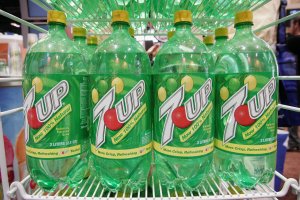
7-Up and other popular soft drinks are sweetened with high fructose corn syrup. (credit: Scott Olson/Getty Images)

Reporting Jon Baird
BALDWIN PARK (CBSLA.com) — Enjoying a can of Coke or a Slurpee in Baldwin Park could soon get more expensive if lawmakers have their way.
KNX 1070′s Jon Baird reports the City Council is looking to neighboring El Monte for inspiration on a proposed tax on sodas and other sugary drinks.
Lawmakers hope the $.01-per-ounce tax would drum up enough revenue for Baldwin Park to chip away at a $1 million deficit and help to fund pensions and retiree health care benefits.
Last week, the El Monte City Council voted to approve a soda tax initiative for the November ballot – a measure which was modeled after a similar one in the Northern California city of Richmond.
If approved, Baldwin Park would become the second city in the San Gabriel Valley and third city in California to enact such a measure.
But if the reaction of residents is any indication, the proposal to tax sodas could fizzle out in a hurry at the ballot box.
“I think it’s stupid because everybody drinks soda anyway,” said one man. “I’m against it.”
“I understand the reasoning behind it, but no, I don’t want to have to pay any extra for any of my sodas,” another man said.
A study (PDF) by the UCLA Center for Health Policy Research and the California Center for Public Health Advocacy released in June found nearly 47 percent of children and teens in Baldwin Park between the ages of 2 and 17 were obese as of 2010.
The measure will be discussed at a special meeting tonight at 6 p.m. at City Hall.
Fizzical harm: Drinking sugary drinks doesn't just pile on the pounds - it changes your body so it's harder to lose weight
- Drinking sugary drinks for just a month alters body chemistry
- More difficult to lose weight
- Body grows to 'prefer' sugar to digesting own fat
By Rob Waugh
PUBLISHED: 10:12 EST, 20 July 2012 | UPDATED: 10:12 EST, 20 July 2012
Fizzical harm? Drinking sugared fizzy drinks for just a month changes the body permanently so it's more difficult to lose weight
Drinking sugared fizzy drinks for just a month changes the body permanently so it's more difficult to lose weight.
The soft drinks don't just pile on the pounds because of the calories in them - they alter the way your body burns fuel.
Your muscles grow to 'prefer' sugar to fat as a fuel, and thus losing weight becomes harder.
Drinking sugary drinks could be even more harmful than previously thought.
Soft drinks alter the way our muscles burn fuel preferring sugar over fat which makes the pounds harder to shift.
And worryingly this effect lasts long-term which can raise levels of blood glucose leading to diabetes.
Dr Hans-Peter Kubis, of Bangor University, said: ‘This study proves our concerns over sugary drinks have been correct.
‘Not only can regular sugar intake acutely change our body metabolism; in fact it seems that our muscles are able to sense the sugars and make our metabolism more inefficient, not only in the present but in the future as well.
‘This will lead a reduced ability to burn fat and to fat gain. Moreover, it will make it more difficult for our body to cope with rises in blood sugar.’
Dr Kubis warned the drinks can compromise long term health and, when in need of refreshment, people should reach for water instead.
His researchers also showed isolated muscle cells identify and respond to the sugary diet, and switch how they use the fuel.
‘Together with our findings about how drinking soft drinks dulls the perception of sweetness, our new results give a stark warning against regularly drinking sugar sweetened drinks.’
The move to an inefficient metabolism was seen in male and female participants who were lightly active, and drinking soft drinks for just four weeks.
These factors show that regular use of sugar sweetened soft drinks drives alterations in muscles similar to those found in people with obesity problems and type 2 diabetes.
Dr Kubis said: ‘What is clear is our body adjusts to regular soft drink consumption and prepares itself for the future diet by changing muscle metabolism via altered gene activity - encouraging unhealthy adaptations similar to those seen in people with obesity problems and type 2 diabetes.
‘Together with our findings about how drinking soft drinks dulls the perception of sweetness, our new results give a stark warning against regularly drinking sugar sweetened drinks.’
In the study 11 people in their twenties took part in a sugar sweetened soft drink supplementation for a month and before and after had their blood and muscle tissue as well as their whole body metabolism and composition tested.
Genes and proteins important for fat and sugar metabolism were analysed and blood sugar and fats assessed.
As it turned out metabolism shifted towards sugar away from using fat and genes for inefficient sugar metabolism were activated and a particular factor which is known to be crucial for genes of aerobic metabolism was reduced. Moreover the subjects gained fat and blood sugar was elevated.
Dr Kubis said: ‘What we found is that it is not the sugar in itselt that puts on weight but the way it gets the body to store more.
‘This would relate to all kinds of soft drinks with a high sugar content, including fruit juices.
‘It was a small study because it is difficult to find young people who have not previously been exposed to a lot of soft drinks and who are willing to undergo muscle biopsies.
‘But we are now hoping to carry out a bigger study with more particpants over a longer period of time.’
He has been campaigning for the government to take action to address the problem of soft drink consumption.
Added Dr Kubis: ‘Clearly taxation on sugary drinks is overdue. This money could be invested in the NHS where it is urgently needed to treat people with obesity problems and diabetes.’
The National Sugar Rush: A Look At America’s Soda Consumption
 Posted by Brian Clark Howard of National Geographic News on July 11, 2012
Posted by Brian Clark Howard of National Geographic News on July 11, 2012
By Drew Hendricks
Updated July 12, 2012 10:45 am
Attention: those delicious sugary sodas are slowly killing you — and your home planet.
Soda consumption is on the rise, and there are negative impacts for both people and the environment. A typical soda contains 10 teaspoons of sugar, which is equal to eating 20 sugar cubes. Soda consumption in children leads to increased chances of obesity, and one in three Americans today is considered obese.
Imbibing just one sugary soda per day increased risks of heart disease in men by 20%, according to one study. The same intake increased diabetes in women by 25%, said another. The average American consumes 22 teaspoons of sugar per day, which equals an incredible 17 four-pound bags of sugar per person, per year.
But as harmful as sugar is for humans, it’s also trouble for the environment. Although it’s one of the most widely produced agricultural crops in the world, there are staggeringly few efforts to repair the environmental damage that sugar production fosters. According to the World Wildlife Fund, 145 million tons of sugars are produced each year in more than 120 countries. Sugar cane production is truly global, and accounts for almost three-fourths of the substance.
But sugar production wreaks havoc on soil fertility, and in sugar-producing Papa New Guinea, fertility has declined 40%. Sugar production, much of which goes into sodas, affects water, air, soil, and can drastically threaten ecosystems. Australia’s Great Barrier Reef has been ecologically threatened by runoff and pesticides from the region’s sugar farms. Excessive agrochemical and effluent pollution and water consumption are top environmental concerns of sugar production. And with many farms burning excess materials from sugar cane, air pollution has also become a worrisome issue.
Pesticides are a clear problem as well, with spray drift affecting biodiversity and impacting unrelated ecosystems. Natural habitats are effected, with wildlife in Florida’s Everglades wetlands impacted by sugar cane production. Hawaii has been producing sugars for hundreds of years, and continues to wrestle with issues of pollutants and waste reduction. And it’s not just the cane plantations that are taking an environmental toll — sugar mills and processing plants contribute negatively to environmental concerns, as well.
There are some more sustainable solutions emerging, such as organic production methods. Efficiency advances in irrigation can reduce water waste, and drip irrigation could aid in greener applications of fertilizers and pesticides. In Brazil, waste plant material from sugar extraction is turned into ethanol fuel, in a loop that is essentially net zero when it comes to carbon emissions.
Editor’s Note: We just received a call from Megan Mitchell, a spokesperson for the Sugar Association, an industry group that promotes the commodity. She told us that more than 90% of sodas sold in the U.S. are actually now made with high fructose corn syrup, which is derived from corn, not sugar cane. She acknowledged that there has been recent debate about the similarities between cane-derived and corn-derived sweeteners, but said the above text and below infographic don’t do justice by completely linking sodas and sugar cane.
We take her point that there are some over simplifications here, although we think this post still has some relevance on the issues, particularly as most of the infographic deals with the caloric value of sodas, not the provenance of the ingredients. Some sodas are currently made with cane sugar (in fact, there has been a recent movement to increase that number). There are also significant issues surrounding the production of corn on an industrial scale, including contributing to the dead zone in the Gulf of Mexico. Still, we recognize the difference between corn- and cane-derived sugars is worth debating and should not be totally glossed over.
Source: InsuranceQuotes.org
Drew Hendricks works in online marketing and content creation for a variety of clients.



















 Posted by
Posted by